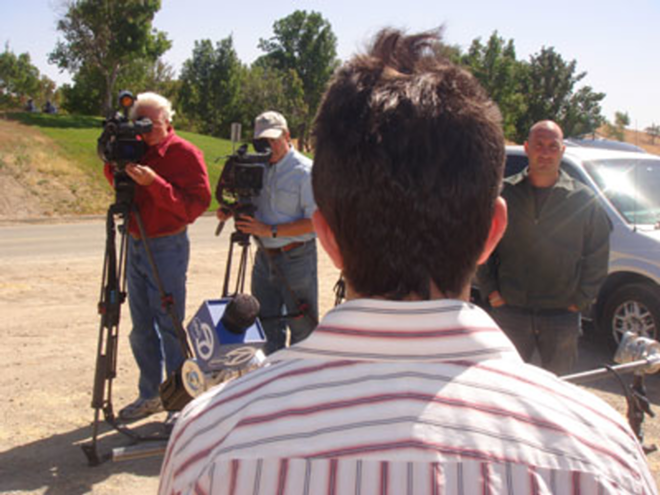
Editor's Note: We got to know Derek Olson when he was in St. Petersburg in 2005, taking part in the Poynter Institute's summer program for young journalists. This story, which appeared originally in Las Vegas Weekly, is a reflection of the independent spirit of both the writer and his subject.
A few months after Josh Wolf's 24th birthday, the freelance cameraman is facing down a media firing squad. Police watch his every move from various posts near a heavily secured prison in Dublin, California. They check the time obsessively. Josh has one more chance to tell the world why he's choosing to go to prison over an hour's worth of video he won't give up. "I think I was an easy target," he tells every network television affiliate in San Francisco. "I don't work for corporate media, and they know I don't have a lot of money for my defense. But I'm not afraid to go to jail. This will have no coercive effect." Then he stumbles over a quote from Thomas Jefferson.
In five minutes, the cameras will capture him walking dramatically alone into a federal slammer 20 miles southeast of Oakland. He has no idea how long he will be there.
He's going back to prison after a failed appeal attempt freed him for three weeks. He hasn't been charged with a crime, just civil contempt — he refused a grand-jury subpoena to hand over footage he'd shot during a rowdy protest in San Francisco more than a year ago. Authorities think the unaired portions of the video contain evidence of criminal activity. Josh insists they don't and says that as a journalist, he shouldn't have to give them up. This belief could cost him the next 18 months, the maximum sentence allowed by a 1970 federal law. His case is Joshua Wolf v. The United States 06-16403. Josh stands 5 feet 6 inches and weighs 140 pounds. It seems a mismatch.
The night before Josh would turn himself in, I arrive in San Francisco. At this point, Josh has no idea I'm coming. I haven't seen him in a year, and he's changed his phone number since then. He's supposed to be in prison already, but got a 48-hour extension to get his affairs in order. I plan to catch him at a benefit thrown by his supporters to raise legal fees. The money raised will be added to $30,000 the Northern California chapter of the Society of Professional Journalists gave for his defense when they named him Journalist of the Year, even though he's never had a full-time job in news.
Then again, until a little while ago, I had no idea I was coming. This is a last-minute self-assignment. So I'm drilling into the illuminated San Francisco skyline in the rented minivan I figure I'll have to sleep in. My girlfriend's on the phone, reading me directions off of MapQuest. All I have is an address Wolf posted on his blog: a downtown bar called Crash.
He has about 16 hours before a 1 p.m. deadline to turn himself in.
I met Josh last year while working on a television pilot for HBO called The Pitch Room, in which documentary filmmakers asked HBO to fund their dream projects, the kind of projects network TV wouldn't air. I was a production assistant; Josh was scheduled to appear on the show to pitch his idea, a doc about schools recovering in Hurricane Katrina's wake. HBO passed, but Josh didn't seem to care (he didn't want to work for Time Warner, anyway) and after a brief wrap party, suggested we go to a nearby bar owned by a friend named Schlomo. We drank microbrews and smoked cigarettes, illegally, all night.
Somewhere in the haze, as the smoke from Josh's all-natural cigarettes bonded with my Camel Lights, we decided to work on our own project — screw HBO. We would give inner-city Oakland school kids their own digital cameras and challenge them to capture their world like no outsider could. We would document the process. Josh said he believed anyone could be a journalist — anyone who records their world and passes on the information in a responsible way: the local barber, the nosy neighbor, bloggers and New York Times reporters.
Not long after that night, I wound up in Las Vegas and Josh found work at a community college public-access station in San Francisco. On his own time, he shot video of stuff happening in the city, sometimes selling it to local TV stations. The Oakland idea went nowhere, of course, but a year later, that same vision of uncompromising citizen journalism landed him in prison.
I find my way to Crash. Inside, the bar is alive with flashing colored lights. Idealists and anarchists of all shapes, ages and races fill the floor with an earthy aroma. Josh, with a Corona in his hand, stands next to an attractive Asian girl. Everyone steals glances at him. I nudge closer. A local firebrand county supervisor named Chris Daly spits rhetoric, punctuated by the occasional F-bomb. "It's a fucked-up situation," Daly says, "that our rights are being stripped by this administration." A bystander clues me in. "He throws these fits at the meetings all the time. He's awesome."

